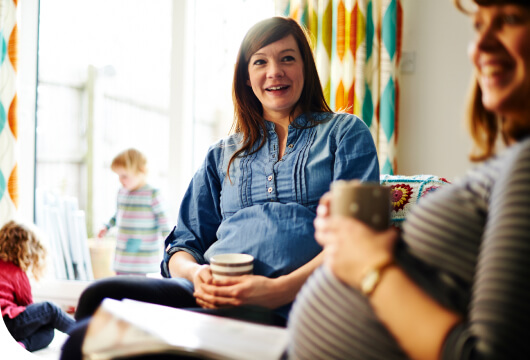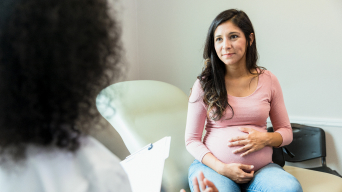Your emotional wellbeing
It is common to feel many different emotions when you find out you have gestational diabetes. You may feel disbelief, worry, sadness, guilt, or disappointment. You may be feeling unsure about how gestational diabetes will affect your pregnancy and your baby.
Every woman’s experience with gestational diabetes is different. Your feelings at this time may not be the same as others. Remember, you are not alone. There is support available to you.
Your emotional wellbeing top tips
Talk to your health professionals. They can help you and let you know about available support.
Do something you enjoy every day.
Reach out to your partner, family and friends. Let them know how you are feeling and how they can help.
Gestational diabetes is not your fault
You may wonder if you did something to cause gestational diabetes or if you are somehow to blame. Gestational diabetes is not your fault.
All pregnant women in Australia are screened for gestational diabetes.
One in six pregnant women will develop gestational diabetes and it can affect any woman during pregnancy.
There are many different risk factors for gestational diabetes. Some of these are things you cannot change such as having a family history of diabetes, your age or being from a cultural background with a higher risk of diabetes. Some women who develop gestational diabetes may not have any known risk factors.
Remember, it is not your fault that you have gestational diabetes, and it does not mean you have done anything wrong. Now you have gestational diabetes, knowing how to manage it can help you to have a healthy pregnancy and baby.
Living with gestational diabetes
Pregnancy is a time of many physical and emotional changes. It can take time to adjust to living with gestational diabetes. There are many extra tasks and things to think about during your pregnancy.
There may be days when you feel like things are going well and other times when it feels like it is more challenging. You may at times feel like managing gestational diabetes is affecting your emotional wellbeing.
Sometimes living with gestational diabetes can make you feel:
Overwhelmed by the demands of choosing what to eat, checking your blood glucose levels and the extra appointments
Concerned about how gestational diabetes might affect your baby
Anxious about your blood glucose levels and what the numbers mean
Frustrated when a blood glucose level is not what you expected
Judgement from those around you who may not understand

Talking about your feelings
There is no right or wrong way to feel. Talking about feelings can be difficult but it can also be a relief. Talk to your diabetes and maternity health professionals about any concerns you have. They can support you to find the best way to look after both your pregnancy and your gestational diabetes. Let your partner, family and friends know how you feel. They can provide a helping hand and listening ear.
If these feelings are making you feel emotionally exhausted, you may choose to talk to a mental health professional. They will help you find ways to cope with the demands of gestational diabetes, and any feelings of anxiety, depression, or stress that you may have.
Getting information and support can help.
Getting support for your emotional wellbeing
Finding ways to look after your physical and emotional health will help you manage your gestational diabetes. It is important to remember that you are not alone.
You could try one or more of the following to support your emotional wellbeing:
Find out as much as you can about managing your gestational diabetes from your diabetes and maternity health professionals. This can make you feel more confident and less overwhelmed.
Look after your physical health by making sure you get enough sleep, drink plenty of water, eat well and keep moving.
Be kind to yourself by taking time to do things you enjoy, like taking a relaxing bath, reading a book, practising meditation or yoga.
Stay positive by turning any negative thoughts into positive ones – I can do this! This can help you stay calm, focused, and optimistic.
Get support by reaching out to your partner, friends, and family for emotional support. You can also ask your health professionals for a referral to a mental health professional.
Connect with other women who have lived with gestational diabetes. This can help you feel less alone and provide you with valuable tips.
Know when you need support
Juggling everything you need to do to manage your gestational diabetes can be challenging. If gestational diabetes is affecting your emotional wellbeing, it is important to know when and how to ask for help.
You can get help from:

Your diabetes health professionals (endocrinologist, diabetes educator, diabetes nurse practitioner and dietitian)





A mental health professional (psychologist, counsellor or social worker)
Support from other women
Even if you are well supported by your partner, family, and friends, it can be difficult for those around you to fully understand what it is like to have gestational diabetes. You may want to talk to other women who have lived with gestational diabetes about their experiences.
Support from other women will help you find out how they managed their gestational diabetes. They can share their insights and experiences and any tips they had to make it easier. Having someone to talk to who understands can be reassuring.
This may be women you meet in your hospital maternity clinic or through attending your gestational diabetes group education program. Friends and family may also know of other women who have lived with gestational diabetes. Your diabetes health professional can let you know about any local support available in your area.
Call the NDSS Helpline 1800 637 700 to find out more about support networks in your area. You can also ask to speak to a health professional about managing gestational diabetes.

